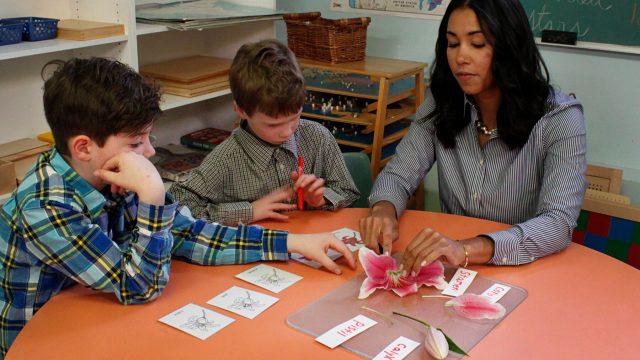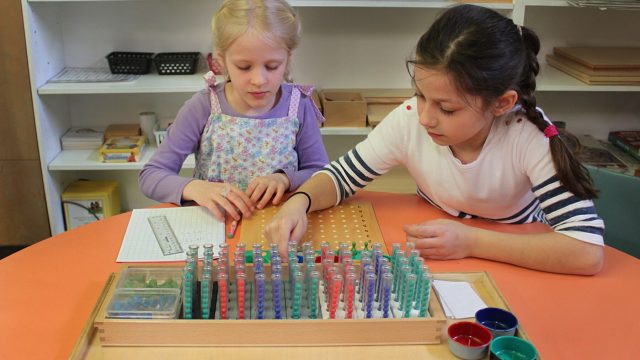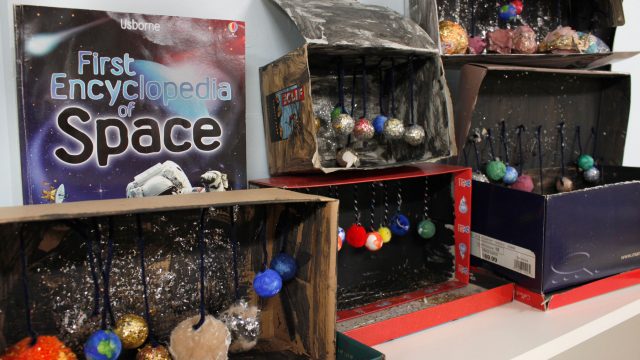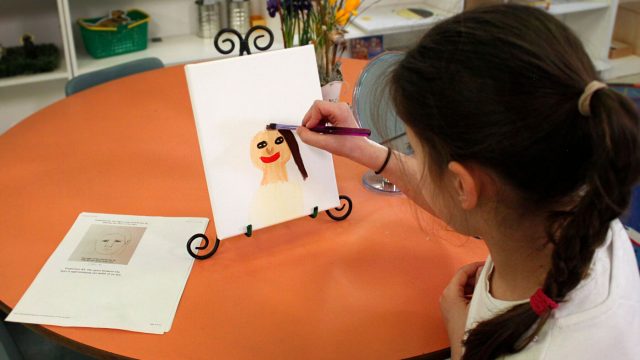Our Philosophy on Education
Philosophy. A word coming from the Greek “philosophia” combines the two words “philo” meaning “love of” and “sophia” meaning wisdom. At Beyond Montessori, we aim to ignite and inspire this lifelong love and pursuit of wisdom.
Our elementary program, for children between the ages of six to twelve, offers the ideal environment for the growth and support of your child’s intellectual, social and creative development. Our approach is simple; through gentle guidance, allow the child’s curiosity and imagination to flourish, leading to something similar to that old Greek model: an insatiable thirst and lifelong quest to delve deeper, to uncover, to critically question, to test and to reason.

Learning—The Sky is the Limit!
Many of us are products of a traditional curriculum; one in which topics of interest are predetermined, schedules are set, and expectations carefully delineated. Montessori classrooms don’t adhere to a prescribed standard. Our children are encouraged to choose to study what they love and they do so, both extensively and deeply in close collaboration with their teacher. The small student teacher ratios allow for close interaction). The teacher, as overseer, sets a basic standard ensuring that the child’s work is diverse, challenging and purposeful.
We believe that limiting the scope of learning, limits the potential (and interest!) of the child.
Our teachers set the bar and your child is encouraged to raise it. The beauty is that there is no limit—only that of your child’s imagination!

The Teacher as Guide, not Lecturer
‘Give a man a fish and you feed him for a day. Teach a man to fish, and you feed him for a lifetime.’ – Chinese Proverb
In Montessori classrooms, children are awarded the freedom to choose, within limits, how much of their day is structured. The teacher’s role is not to teach, but rather, to demonstrate, lead and provide the children with the right questions. These questions lead the child to the tools needed for them to discover the answers on their own, a far more sustainable and impactful way of acquiring knowledge. Just like the proverb, we believe in creating self-sufficient, resourceful and tenacious young individuals with the skills to investigate independently.
Furthermore, our multi-age group promotes peer teaching and a good social dynamic. It is common in our classrooms to find children, who have reached a level of mastery, helping those just getting started
How We Holistically Support Your Child’s Development
As Montessorians we understand that your elementary aged child is at a point in their life where socializing and connecting with others is more important than ever before. This is why we nurture an environment where social interactions are not only allowed, they are encouraged! Our teachers provide lessons in small groups, allowing children to work together, all while having the freedom to move about the classroom. Our students are not confined to desks and they are not required to ‘go with the flow’ like dead fish or perhaps even worse, be unable to keep up with the flow and get left behind. Instead, they are a part of a room alive with the exchange of ideas, questions and concepts.
Beyond the Classroom, Going Out
“Going out” is a huge part of the elementary Montessori curriculum. We understand that while the four walls of the classroom set the groundwork for learning, that they are limited to the, albeit wonderful, books and materials on the shelves. We want our children to experience real-world scenarios and be comfortable acquiring knowledge outside of our school setting.
A Going Out experience is often sparked by the children themselves! They make the calls, set the schedule and arrange for appropriate supervision and transportation.
While outside of the school, the children demonstrate the lessons they’ve learned regarding grace and courtesy and they conduct themselves with dignity and respect.
Our new facility also provides us with the opportunity to naturally extend our classroom space to include the outdoors and nature, in a gated outside classroom environment. Your child may choose to utilize a natural environment in their everyday learning!

Planting the Seed and Watching it Grow
Montessori classrooms are rich with topics of interest and study. We like to offer a diverse curriculum that is flexible enough to allow for discussions on current events, open-minded enough to ‘follow the child’ or allow the child to suggest a topic of study, and broad enough to include just about every subject. Our teachers introduce new subjects by painting an impressionistic and scientific picture called a “Great Lesson.” These lessons serve as the impetus to your child’s discovery by creating a “big picture” of astronomy, earth sciences, geography, history, anthropology, cultural and social studies, language, math, physics, biology, music and art.
Many students walk away from a Great Lesson with questions and it’s those questions that ignite a desire to learn more through research. Often, the children will take this learning to new levels; far surpassing what the teacher had envisioned.
Critical Thinking and Conversational French
Our elementary students will benefit from a rich and diverse Montessori curriculum which will be taught by an Accredited Montessori Directress. Conversational French will be enjoyed daily, taught by our in-house school French Teacher. The Montessori Classroom environment will help students develop lifelong critical thinking and cognitive abilities, a greater sensitivity to languages and multi-culturalism, and a better ear for listening.
Achieving the State of “Flow”
As a teacher, there is no better feeling than finding your student totally immersed in their work. It is not uncommon in a Montessori setting, for students to become so wrapped up in what they’re doing that they ask if they can continue their work, without interruption, eschewing breaks and social time for more of what they love.
In a world that moves so fast, where curiosity is often satisfied with a few clicks, the ability to focus and concentrate is so important to nurture in our students. Our classrooms respect the child’s curiosity and need for uninterrupted time with long, open-ended work periods that allow children to reach a deep state of concentration.
Amazon CEO Jeff Bezos was known to become so immersed in his work as a young Montessori child that he had to be picked up and carried away from a task. One wonders, what could have been if the Jeff Bezos’, Larry Page’s and Sergey Brin’s of the world were part of a system that didn’t allow for that kind of immersion?

Inspiring a Love of Learning
Wouldn’t everyone benefit from going to work everyday knowing that they love what they do?
In a Montessori classroom it’s not uncommon to find children who feel that way. Our goal is to help students fall in love with learning by allowing them to shine. We don’t subscribe to external rewards and we don’t penalize our students. Instead, we allow them to find discipline in what they do by continually guiding them toward acquiring a strong belief in themselves and their abilities. Once this is achieved, the children are inspired to learn and this inspiration will follow them throughout their lives.